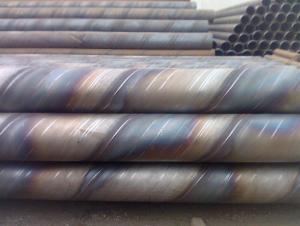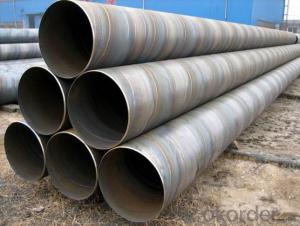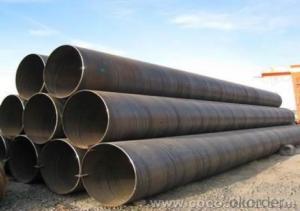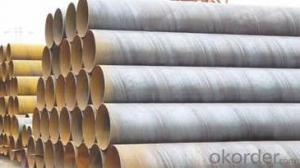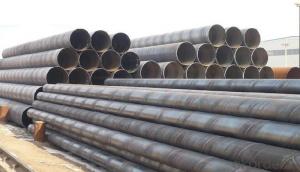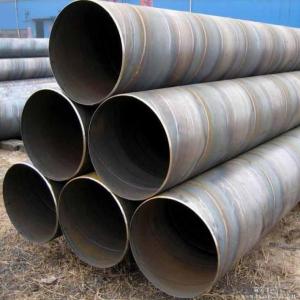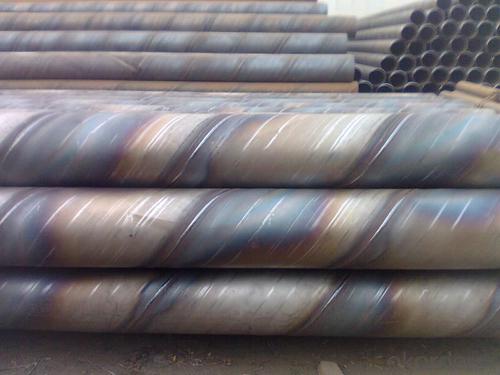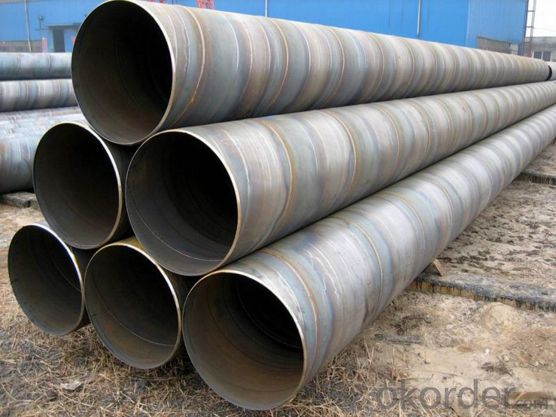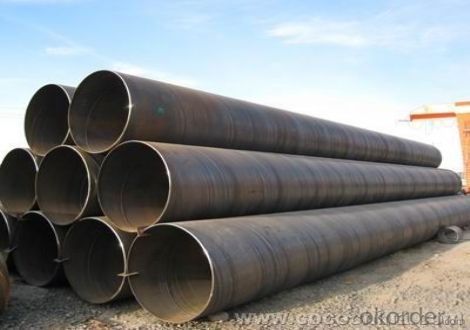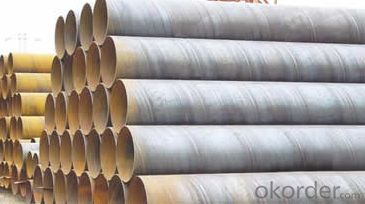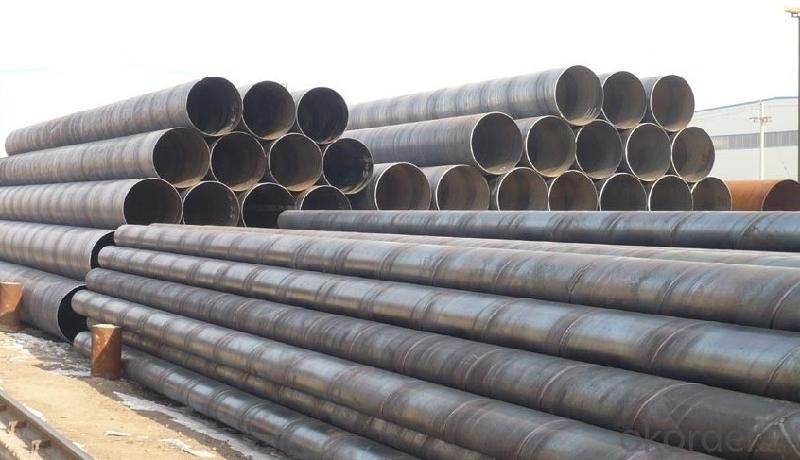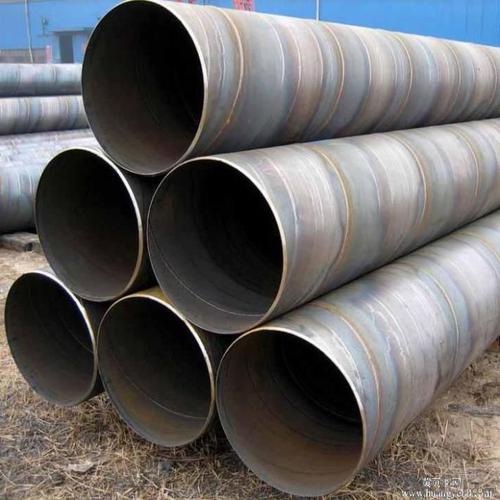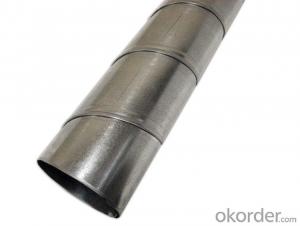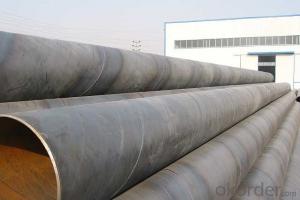SPIRAL STEEL PIPE 32’‘ ASTM API LARGE DIAMETER PIPE
- Loading Port:
- Tianjin
- Payment Terms:
- TT OR LC
- Min Order Qty:
- 5 m.t.
- Supply Capability:
- 3000 m.t./month
OKorder Service Pledge
OKorder Financial Service
You Might Also Like
Packaging & Delivery
Packaging Detail: | standard export packing or as customer's requirement |
Delivery Detail: | within 10 - 30 days |
Specifications
Spiral Welded Steel Pipes and Tubes
1.Material:Q195-Q235
2.Length:1-12m
3.WT:1.0-14mm
4.O.D.:20-273mm
Spiral Welded Steel Pipes and Tubes
Product Description:
1.Material : Q235,Q345,L245,L290,L360,L415,L450,L485,GrB,X42,46,X52,X56,X60,X65,X70,X80,X100
2,Standard: SY/T5037-2000,GB/T9711-2011,API Spec 5L PSL1/PSL2,ASTM A252\A53,ISO3183,DIN17172,EN10217,JIS G3457,AWWA C200,ASTM A139,ASTM A671,ASTM A672
3.Wall thickness: 3.0mm-30mm
4.Outer diameter: φ168mm-3020mm
5,Length: 5m-12m or as your requirement
6,Corrosion protection standard: DIN30670,DIN30671, AWWAC210, AWWA C203, SY/T0413-2002,SY/T0414-2002
7,Application: Oil, gas, natural gas, water pipe, thermal electricity pipe, steel structure engineering, etc
Q195-q345 Material Steel Pipe's Materials
Elements | Chemical Compsition% | Mechanical Property | ||||||
C% | Mn% | S% | P% | Si% | Yield Point (Mpa) | Tensile Strength(Mpa) | Elongation | |
Q195 | 0.06-0.12 | 0.25-0.50 | <0.050 | <0.045 | <0.030 | >195 | 315-430 | 32-33 |
Q215 | 0.09-0.15 | 0.25-0.55 | <0.05 | <0.045 | <0.030 | >215 | 335-450 | 26-31 |
Q235 | 0.12-0.20 | 0.30-0.70 | <0.045 | <0.045 | <0.030 | >235 | 375-500 | 24-26 |
Q345 | <0.20 | 1.0-1.6 | <0.040 | <0.040 | <0.55 | >345 | 470-630 | 21-22 |
- Q: How do steel pipes compare to other materials, such as PVC or copper?
- Steel pipes are generally more durable and have a higher resistance to heat, pressure, and corrosion compared to PVC or copper pipes. They are commonly used for applications that require strength and longevity, such as in industrial settings or for transporting high-pressure fluids. However, steel pipes can be more expensive and heavier than PVC or copper, making them less suitable for certain residential or lightweight applications. Ultimately, the choice of material depends on the specific requirements and budget of the project.
- Q: What are the different coatings used on steel pipes?
- There are several different coatings used on steel pipes, including but not limited to epoxy coatings, polyethylene coatings, zinc coatings, and galvanized coatings.
- Q: How many fasteners are there in a ton of steel tubes?
- In general, 180-200 fasteners per ton of steel pipe.
- Q: How are steel pipes used in the construction of stormwater drainage systems?
- Steel pipes are commonly used in the construction of stormwater drainage systems due to their durability and strength. They are used to create underground networks that efficiently channel rainwater away from urban areas, preventing floods and water damage. Steel pipes are resistant to corrosion and can withstand heavy loads, making them suitable for the long-term and reliable functioning of stormwater drainage systems.
- Q: Can steel pipes be used for conveying compressed air?
- Indeed, compressed air can indeed be conveyed through steel pipes. In industrial settings, steel pipes find frequent use due to their ability to withstand high pressure and maintain durability. With their remarkable tensile strength, steel pipes prove capable of handling the immense pressures generated by compressed air systems. Furthermore, the resistance of steel pipes to corrosion becomes crucial when confronted with moisture within compressed air. Nevertheless, it remains vital to guarantee that the steel pipes are adequately sized and rated to meet the precise pressure and flow prerequisites of the compressed air system. Moreover, adhering to proper installation and maintenance practices becomes imperative to avert any potential leaks or failures.
- Q: What are the factors to consider when selecting steel pipes for a specific application?
- When selecting steel pipes for a specific application, factors such as pipe diameter, wall thickness, material grade, corrosion resistance, temperature and pressure requirements, environmental conditions, and cost should be considered. Additionally, factors like durability, strength, weight, ease of installation, and compatibility with other components in the system should also be taken into account.
- Q: How do you calculate the pressure drop in a steel pipe?
- To calculate the pressure drop in a steel pipe, you need to consider several factors such as the diameter and length of the pipe, the flow rate of the fluid, and the properties of the fluid itself. One commonly used equation to calculate the pressure drop in a pipe is the Darcy-Weisbach equation, which is given as: ΔP = (f * (L / D) * (ρ * V^2)) / (2 * D) Where: ΔP is the pressure drop in the pipe f is the Darcy friction factor, which depends on the pipe roughness and Reynolds number L is the length of the pipe D is the diameter of the pipe ρ is the density of the fluid V is the velocity of the fluid To calculate the Darcy friction factor, you can use different methods depending on the flow regime. For laminar flow, you can use the formula f = 16 / Re, where Re is the Reynolds number. For turbulent flow, there are several methods to determine the friction factor, such as the Colebrook equation or the Moody chart. It is important to note that the properties of the fluid, such as its viscosity and density, may vary with temperature and pressure. Therefore, it is necessary to consider these variations when calculating the pressure drop. Additionally, it is worth mentioning that there are other factors that can affect the pressure drop in a steel pipe, such as fittings, valves, and elbows. These factors introduce additional losses, which can be accounted for by using appropriate correction factors or by directly measuring the pressure drop across these components. Overall, calculating the pressure drop in a steel pipe involves using the appropriate equations, considering the properties of the fluid, and accounting for the various factors that may affect the flow. It is recommended to consult relevant engineering handbooks or utilize specialized software for accurate calculations.
- Q: Can steel pipes be used for underground compressed air pipelines?
- Yes, steel pipes can be used for underground compressed air pipelines. Steel pipes are commonly used for underground pipelines due to their strength and durability. They have the ability to withstand high pressure and can resist corrosion and other environmental factors. Steel pipes are also known for their long lifespan, making them a reliable choice for compressed air pipelines. However, it is important to ensure that the steel pipes are properly coated and protected to prevent any potential corrosion issues. Additionally, proper installation and maintenance of the pipelines are crucial to ensure their efficiency and safety.
- Q: How do you prevent leaks in steel pipes?
- One effective way to prevent leaks in steel pipes is by implementing a regular maintenance and inspection schedule. This includes checking for any signs of corrosion, damage, or wear and tear on the pipes. Additionally, using high-quality coatings or protective materials on the pipes can help minimize the risk of leaks by providing an extra layer of protection against external factors. Proper installation techniques and ensuring a secure connection between pipe joints are also crucial in preventing leaks.
- Q: How are steel pipes connected in pipeline construction?
- Steel pipes are connected in pipeline construction through various methods such as welding, threading, and flanging. Welding involves joining the pipes using heat and fusion, creating a strong and durable connection. Threading involves screwing two pipes together using threads on the ends of the pipes. Flanging involves connecting the pipes by bolting together flanges on the ends of each pipe. These connection methods ensure a secure and leak-proof pipeline system.
Send your message to us
SPIRAL STEEL PIPE 32’‘ ASTM API LARGE DIAMETER PIPE
- Loading Port:
- Tianjin
- Payment Terms:
- TT OR LC
- Min Order Qty:
- 5 m.t.
- Supply Capability:
- 3000 m.t./month
OKorder Service Pledge
OKorder Financial Service
Similar products
Hot products
Hot Searches
Related keywords
